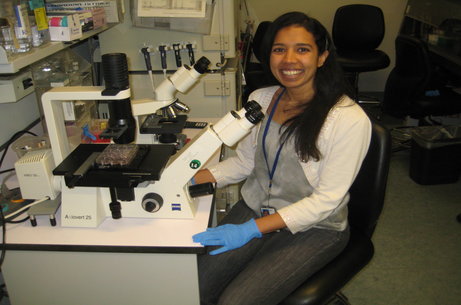
Muktha Natrajan talks about her research on potential treatments for the progressive stages of multiple sclerosis.
Multiple sclerosis is an autoimmune disease which affects more than 2.3 million people around the world. Patients are typically diagnosed around the age of 30. Initially, the early symptoms go into remission after attacks, but as patients get older the disorder starts to progress. Muktha Natrajan [2011] is studying why this happens with a view to creating potential treatments for progressive stages of the disease. “After an immune attack, the adult stem cells are not able to regenerate myelin around nerve fibres in the brain,” she says.
She is trying to understand the link between why neural stem cells fail to regenerate myelin in MS patients and how to harness the beneficial aspects of the immune system to promote regeneration in ageing subjects. Previous research indicates ageing may play a detrimental role in the recruitment and function of monocytes, a type of white blood cell, which her research aims to further elucidate.
Working in partnership with the National Institutes of Health in the US, she is looking at potential drug targets and her supervisor is currently raising funding for new clinical trials for treatments.
Muktha says: “My research provides a bridge between neuroscience and immunology and travelling between Cambridge and the NIH means I get both the laboratory perspective and an understanding of how MS affects people. It is very exciting to be working on potential treatments for MS. Current treatments focus on the early stages and on only some forms of MS. There is basically nothing available for the more progressive forms.”
Childhood
Muktha was born in Augusta, Georgia, to a family with a strong interest in biology. She has two older siblings, both of whom are in medicine. Her father is a doctor and her mother has a PhD in organic chemistry.
Nevertheless, when she was at high school Muktha wanted to do accountancy. “We did not learn anything at school about financial planning and I thought it was important,” she says. When she started her combined undergraduate and masters degree at the University of Georgia she was majoring in accountancy and biochemistry. However, her plans soon changed after she applied for a research fellowship at the Centre for Undergraduate Research Opportunities. She felt it was a unique chance to start research at such an early stage in her career. Moreover, her older sister had done it and recommended it. At an orientation session before she started university she had met a professor who was doing research on neural stem cells and was impressed. She applied to work in his laboratory as part of the fellowship.
Environment and stem cells
In her first year she was working with a graduate student on his project, but by the end of her second year she was able to work on a proposal which combined two of her interests – environmental health and neural stem cells. In the summer of her first year she had been to China to study the exchange of invasive plants species between the US and China, looking at alternative, beneficial uses for invasive plants, such as recycling carbon or providing a source for biodiesel.
Muktha wanted to study the long-term impact of environmental toxins on human neural stem cells. Her initial interest was in Parkinson’s Disease, but she eventually broadened this out to other disorders which were caused more by the environment than genetics. She studied the effects of exposure to the chemical element manganese. Studies show that low doses help cells, but high doses are damaging. “I was trying to figure out where the balance was between low and high levels,” says Muktha. She studied this for a year and a half and wrote it up for her masters thesis.
One of the requirements of her masters in public health was that she do an internship. Muktha was working for a non-profit called Promote Africa which she joined because she wanted the opportunity to do hands on work in the area of development aid. The organisation funded grant proposals from people living in Namibia. In the summer after her third year Muktha decided to approach the WHO in Southern Africa about internships and was accepted to do an internship in Namibia. Part of her internship was spent looking at the cognitive effects of using wood burning stoves. She found a link between the stoves, mental health and maternal and child health mainly from breathing in the compounds released in the burning process. The internship meant she could also do site visits for Promote Africa. “A lot of what we were doing in the US was fundraising, but meeting the people who were using the money and seeing their passion really motivated me to do more,” she says.
In her fourth year she applied to several universities to do a PhD in neuroscience. She researched different possibilities and spoke to Professor Robin Franklin at the University of Cambridge. She felt she could really learn from him and liked the way he challenged her on the research she was doing at the time.
She started her PhD in Clinical Neurosciences in 2011. Gates Cambridge is not her first scholarship – she also got a Goldwater Research Scholarship while at the University of Georgia. She has been alumni officer on the Gates Cambridge Scholars Council and worked on a mentoring programme, but most of her time has been taken up with her research, including presenting her findings at conferences around the world. Muktha plans to do a post-doctoral fellowship after her PhD and to continue to work on treatments for MS.












